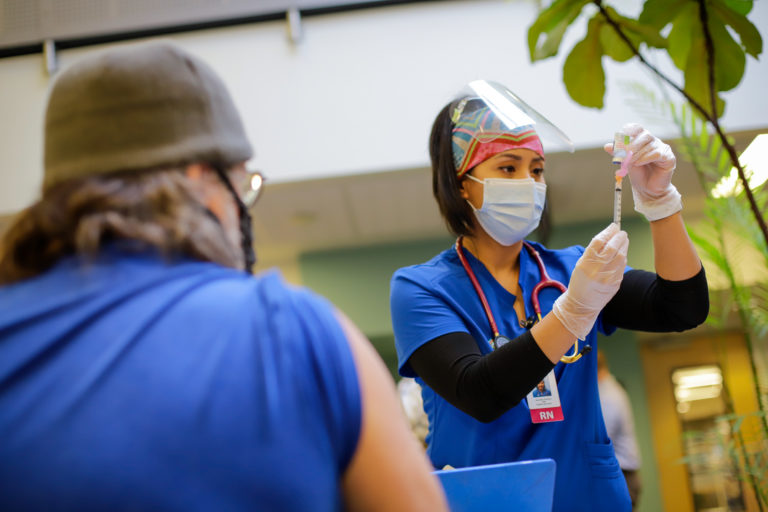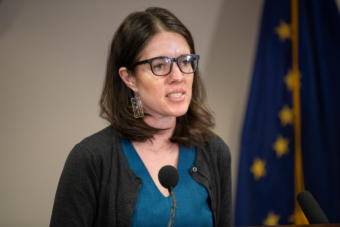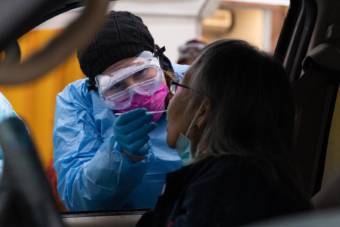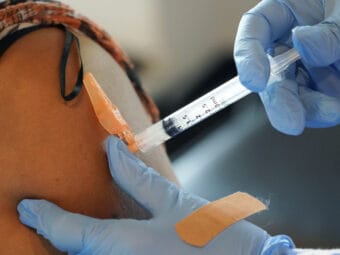
Tom Quimby’s job feels way different than it did a year ago, when he was working as a doctor at the Mat-Su hospital’s emergency department without the protection of the COVID-19 vaccine.
Now he leaves his industrial respirator in his garage, and his colleagues are growing beards because they’re not as worried about getting a tight seal on their masks.
“Before, we were all really, really worried,” Quimby said in an interview. “Even though we’re still wearing masks, and we still gown up going into a room, it doesn’t feel as stressful as it once did.”
That’s the good news.
Cases in the Mat-Su, and across the state, are far below where they were during the height of the pandemic. But COVID-19 patients are still showing up in Quimby’s emergency room.
His region is among the state’s least-vaccinated, and Quimby said it can be dispiriting to see patients coming in for treatment for what’s now a largely preventable illness. He compared it a woman at the hospital who’d fallen off a motorcycle, wasn’t wearing a helmet and ended up brain dead.
“You’re just like, ‘This is so needless,’” Quimby said. “And you just see the anguish and pain, and you can’t help but just feel frustration about that.”
Vaccination rates vary widely across different regions and communities within Alaska, so the virus represents different risk levels in each place.
In the Mat-Su, for example, the vaccination rate for eligible people is just 39%, compared to 77% in the City and Borough of Juneau.
But public health officials are still hitting on some consistent messages statewide — namely, that the shots remain the best weapon against the virus.
That includes combatting the delta variant, which spreads far more quickly than other strains and represents a growing share of Alaska’s cases: 40% in the state’s most recent report on variants, up from 7% just two weeks earlier.
The number of cases, meanwhile, remains low relative to last year’s highs. But they’ve been ticking up over the past three weeks.
Health officials stress the risk of serious illness from COVID-19 now is almost exclusively among the unvaccinated. Some 97% of Alaska’s COVID-19 hospitalizations, and 99% of deaths, are among unvaccinated patients, said Dr. Anne Zink, Alaska’s chief medical officer.

“While every choice we make has risks and benefits associated with them, for the vast majority of people, getting vaccinated is a much safer choice for preventing illness and minimizing the impacts of this virus on your life,” Zink told reporters at a briefing Thursday. “I just continue to encourage Alaskans to seriously consider that option, particularly as we see the delta variant spreading.”
Alaska has now fallen behind in the national vaccine race, however. Early in the pandemic, it was one of the leaders in giving out shots. Now, it’s ranked close to 30th among the 50 states.
Nonetheless, many of Alaska’s elders and most vulnerable residents are now protected, which makes for a very different experience for those on the pandemic’s front lines. In the rural Southwest Alaska hub town of Bethel, Dr. Ellen Hodges said her hospital hasn’t seen a COVID-19 patient in weeks, and she now occasionally gets to take days off.
“I’m much, much less anxious, and I’m able to sleep better, and all that kind of stuff,” she said. “I still do worry — I don’t want anyone to get COVID. But it’s so much better.”
Hodges is chief of staff at the tribally-run Yukon-Kuskokwim Health Corp., whose region was hard-hit by the pandemic.
While things have markedly improved there, YKHC is still operating under emergency response protocols using an incident command system, Hodges said. And the region recently faced a COVID-19 outbreak in one of its villages, Hooper Bay.
But because so many elders have been vaccinated, people weren’t getting seriously ill or requiring hospital treatment during that outbreak, Hodges said.

(Katie Basile/KYUK)
But YKHC’s region has one of the state’s youngest populations, and most children are ineligible for the vaccine — and vulnerable to the virus, Hodges said.
“It is less disruptive, in some ways, because our hospital isn’t overwhelmed, our ICU isn’t overwhelmed,” she said. “However, I worry about every single person who gets it, because of all these long-term consequences that people can experience.”
Officials across the state are targeting their pro-vaccine messages toward parents and children right now.
That’s in part because school sports start up in a manner of weeks, and it takes more than a month after the first shot to get full protection from most vaccines. Students who are vaccinated also will not have to quarantine after potential exposure to the virus.
Chief medical officer Zink said without a major shift, like a spike in cases or full federal authorization for the vaccines, she thinks it’s going to be a tough slog to significantly boost vaccination rates beyond where they are now.
But Quimby, the Mat-Su doctor, said not all unvaccinated people are adamantly opposed to getting the shots: He still sees people in the hospital who just need a nudge from a trusted friend or medical professional.
“I still, almost daily, get people who are like, ‘Oh, no, I hadn’t really thought about getting the vaccine.’ And I’m like, ‘What?!’” he said. “There are still those people out there.”



